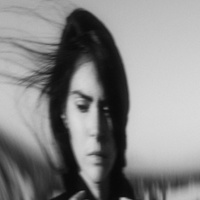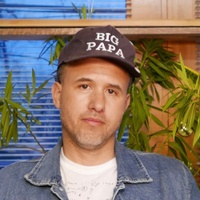On conjuring a collective and keeping your friends close
Prelude
Extra Practice is a space for working and learning in the North of Rotterdam, shared by five friends who are active in the field of art and design.
The space originated from a desire to create a “school-after-school”; a fruitful environment for working and learning amongst peers. Extra Practice organizes workshops, presentations and public events to share their collective insights and experiences.
Conversation
On conjuring a collective and keeping your friends close
Extra Practice discusses the significance of their name, sharing meals and rearranging furniture, the challenges and joys of balancing individual and collective work, and their aspirations for the next iteration of their space.
As told to Elliott CostTiana Dueck, 3231 words.
Tags: Art, Design, Research, Education, Collaboration, Process.
Elliott: When I first visited Extra Practice, I noticed a long Google Doc printed out and hung on the wall with all the potential names for the space. Can you tell us about the origin of the name “Extra Practice” and how you all met?
Emma: It all started with me, Ben, and Gijs after we graduated. We were working on this project together and to receive funding for it, we needed a company, and a name.
Ben: Once we started working together we thought, “we miss school and we want some sort of space to do things together after school.”
Emma: If you look through the words on the doc, there are a lot of terms like “learning,” “amateurs,” but also a mix of words that relate to being light, emphasizing “we are not professionals; we don’t know what we are doing.” On the other side, there are professional words like “office,” “desk,” “conglomerate.”
Jack: I guess we are always testing out what Extra Practice actually is. At some points, it’s just a space that is called Extra Practice, but when we’ve done things together, in those moments, it feels more like we are a collective.
Emma: But coming back to the word “Practice”, we did mean it in this double way as a place to learn more things because we were so fresh out of school, but also like an art practice outside of our own practices.
Gijs: Yes, like outside of, next to, or adjacent to our individual practice. That was really chapter minus-one of the space.
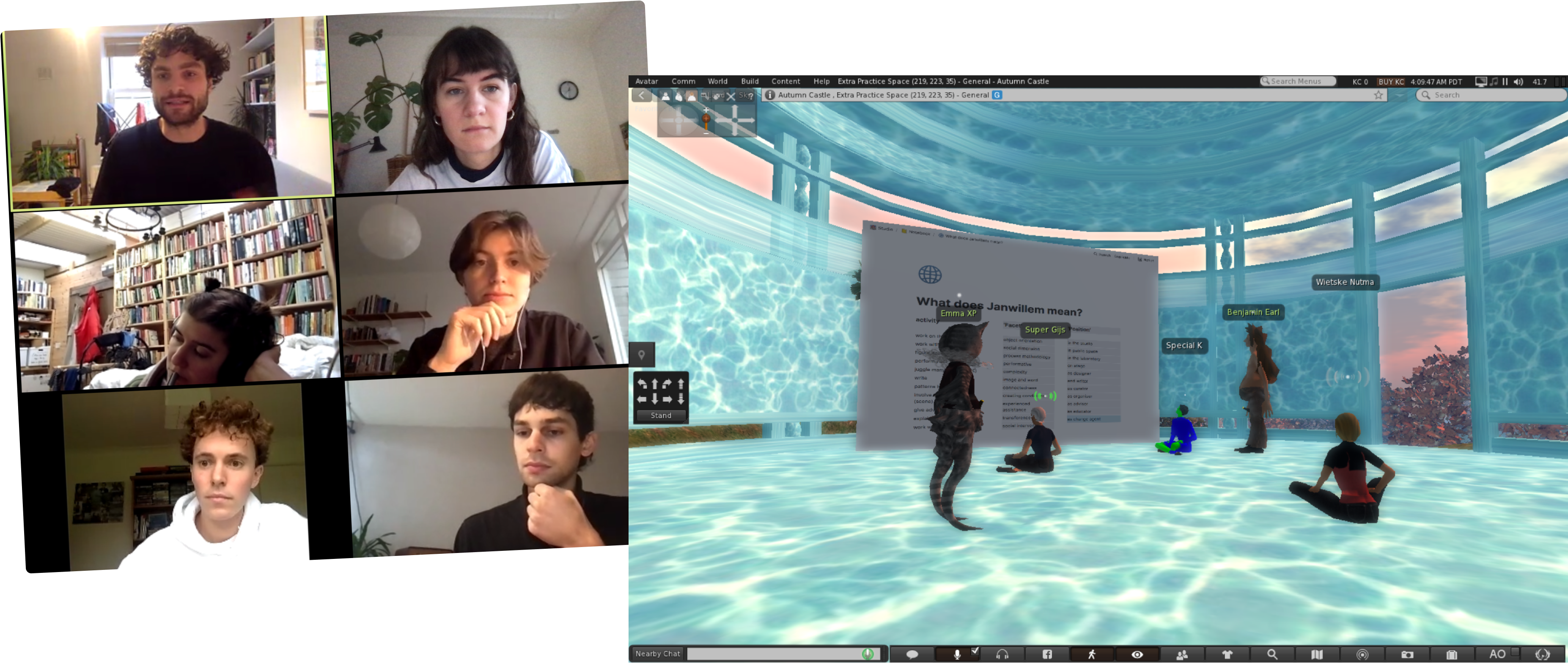
Gijs: We had this company registered at the Chamber of Commerce that we didn’t have plans for. The pandemic happened and at some point, there was this idea of doing a reading room. We wanted to host it in something similar to Second Life, and we to paid for this world through Extra Practice. That was the first instance this company was used to create a collective space for us to come together. Around that time, Ben also made a website and we copied the structure of a school with different departments. We thought of different research groups and we started thinking that we didn’t want Extra Practice to be a company. We wanted it to be a space to explore working and living together. Wait, I mean working and learning together. Maybe living is the next thing. [laughs]
Jack: We will get to the commune later. [laughs] The other part of your question is how we met each other. I met Ben in his apartment in Amsterdam. We also studied together, so we might have bumped into each other, but not properly. I had just broken up with my girlfriend when I was moving to the Netherlands, and Ben very kindly put me up in his apartment because I didn’t have anywhere to stay, and he looked after me. He took me under his wing, and it was very cozy.
Ben: Jack and I were also going to study at KABK, which is where I met Emma. Emma and I studied in the same department called Nonlinear Narrative.
Emma: When graduation came closer, I wanted to work with Ben because he was one of the hardest workers in the department, and I just felt like I needed to have him on my team. And then I was dating Gijs, so that’s how the company started.
Gijs: Kirsten also has multiple links. We both studied at Design Academy Eindhoven. Kirsten was studying in a different department, but she was often to be found on the sofa in my department, Contextual Design. We were friends from that time.
Kirsten: After graduation I moved into a new place, and Emma told me I was going to have the best neighbors ever. It turned out that these guys [pointing at Jack and Ben] moved in next door.
Jack: Then we knocked down our wall [between our apartments], and we got some new housemates.
Gijs: There’s not one clear origin story. We grew towards each other in all these random entanglements.
Tiana: How does it benefit your life to have a shared space?
Jack: I’ve realized it’s the most stable part of my life. That’s what benefits me. I start all these initiatives, and my housing and work are so precarious, but when I come back to this space, it’s really anchoring. It’s so nice to have this space with my desk, but also the same group of friends that I’m able to check in with, and they know your problems. It just feels like a home that I can keep coming back to. It allows me to think. I realized quite strongly how I attach certain thought patterns to space as well. So, I can always return to Extra Practice and lock back into those things.
Elliott: We are sitting around this big table. Can you tell us about the big table and what importance it plays in the space?
Gijs: Yeah, I love this table. It’s a magical part. I picked it up from Marktplaats in Eindhoven when I was furnishing a house where my classmate and I were going to live. I was happy to find it because it was the exact same table as the ones we had in school. In our old house, people would sit there after school to work or have dinner or chill.
Emma: It’s nice that this table isn’t only for us. It’s also a gathering space. We always do lunch together, but also have meetings here. We have quite a lot of extra guests that can be friends, but also people that know us from the internet, like you guys. So, there’s always enough space for people to work here. I think that’s a really important part of Extra Practice. We are five people, but we are also really open, or at least we want to be.
Jack: It’s a warm desk instead of a hot desk [laughs]. A welcoming one for anyone that wants to use it.
Gijs: Yeah, it kind of embodies all the collectivity besides our individual practices.

Extra Practice’s big table.
Ben: One of the things I really like about the big desk is that whenever you come in the morning, you have the remains of what happened the previous day. Even when you haven’t been there for a few days or a week, you can see there’s paper or crumbs.
Kirsten: You like that?
Ben: There’s something kind of nice about seeing the collective activity. I hope for this new space, that the big public space also becomes a big table where things are a little bit left over, and you see activity going on there that goes on for a longer period of time and also allows for the space to exist so we don’t have to clear it away.
Elliott: It seems like the furniture in the space acts as these different containers for activity or practicing.
Ben: A lot of the furniture in here we built ourselves, apart from this table. So I feel like a lot of the stuff in here is made through the act of learning to make, depending on what we needed at that moment. We needed a place to put some shelves, so we built a shelving unit that was specifically made for these types of boxes that we had, and then at one point we needed a bar, or a place to put DJ decks, or a place to put speakers. So suddenly this came about. It’s about looking at what we need and learning to be like, okay, we can do this ourselves.
Elliott: I was rereading the guide we created together, and something that struck me was this part that said having too many spaces for work makes the space feel more like an office than a place for play or a place to practice.
Jack: We are constantly reconfiguring the space and reshuffling things. Maybe this is a sort of meta-struggle that happens in life in general, of having a space to come and do work that’s not my house, but then also wanting this place to be a place that we can do not-just-work things at, that we can use it as a place to experiment and play. We are always trying to keep that balance. I remember when we made the cozy corner, we needed somewhere to chill out and just read and not do work. Balancing commercial work that pays the bills with maintaining a playful, experimental approach in non-commercial projects like the school-after-school concept is a general struggle.
Tiana: What differences are key between your home and Extra Practice?
Jack: Having a contract. [laughs]
Gijs: Yeah and a shower.
Elliott: To add to that, mentally, how do you distinguish these spaces? And also before having this space together, how did you work and then how did it change your work, to have this space?
Ben: Before we got this place, we were all working from our homes. It’s been a real struggle for me to find where the balance lies between work and home life. Sometimes my work-life balance feels off, but over the last year, I’ve managed it by strictly compartmentalizing my life. Different places for different activities. At Extra Practice, I work, but it’s also a space for doing things with other people. Even when I’m working by myself, I’m still somehow engaged with others. When I come here, I usually have specific things I want to do, things in my head. At home, it’s different; I don’t usually go there with the intention to do things.
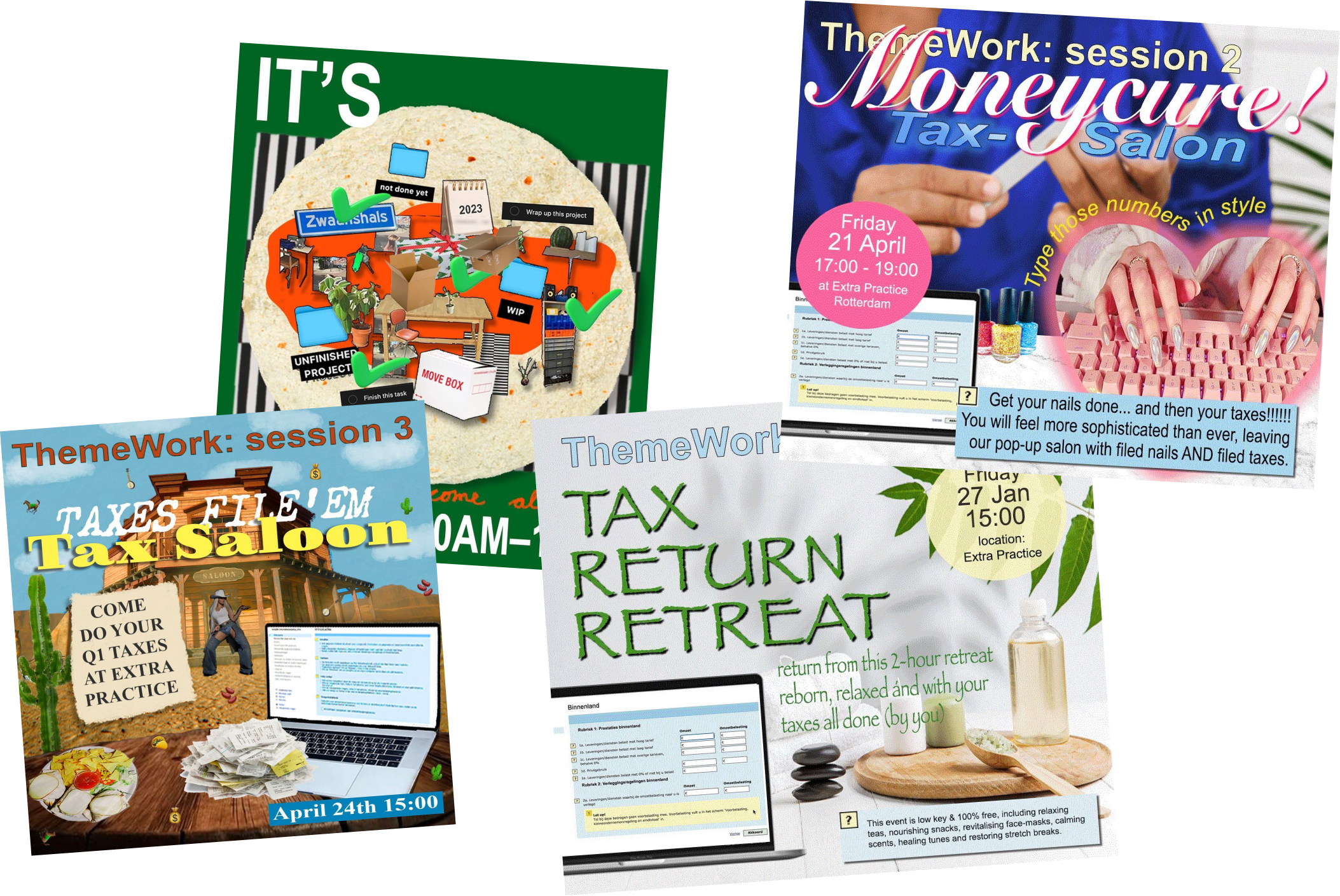
Flyers for events at Extra Practice.
Tiana: I’m wondering if there’s any recent special memories you have at XP that you’d like to share? I remember when you had the tax day, and Emma’s sister came in and did nails; it was like a nice way to make light of an unfortunate task.
Jack: We had this recurring thought today, and it’s a bit sad because we’re going to leave. But it’s about Henk, the neighbor next door, walking past and waving at us. It feels like a part of a constant narrative here. He’s always sharing anecdotes about the history of this place and the stories of what used to happen on this street.

Photo by Dewi Kruijk
Elliott: I really liked that anecdote of Henk waving through the window. I was curious about the broader community in the area and how Extra Practice fits into that. How do you relate to your neighbors and the street that it’s on and this area of Rotterdam?
Ben: We have this thing in Rotterdam called Groot Rotterdams Atelier during which we discovered that there are five or six studios around us. All kind of similar in size, maybe between three to ten people. These days there’s less and less space in Rotterdam to do this kind of stuff. So these other studios felt like little golden nuggets that are in this sea of fancy shops and houses. I worry that I might look back in 20 years and wonder why we didn’t host more events at XP, because it’s so nice to connect to a broader field of practitioners, whether it’s other designers or artists or just family or friends. It’s quite valuable to nurture that community.
Elliott: I was just thinking about the garden. It’s also a connection to the community. Can you tell us a bit about the XP garden? What’s in the garden?
Gijs: When you talk about connection, I mostly have to think of the moments where we made the garden. There was no garden when we got the space, but there’s this rule in Rotterdam that you can make a garden by lifting a few street tiles. So we started one and already had several rounds of expanding our garden. Neighbors would pass by, and would say hi and enjoy that we were doing this, and they would also see us struggle. One neighbor offered us a hammer, another neighbor offered us a crowbar to get the tiles out. Sometimes things we planted just died, and it felt like we might have disappointed the neighbors a little, but now the garden seems to be quite good. At least for the last two years we have had sunflowers and they are always a nice sight in summer. Sometimes we have old basil plants that we put there, they grow tougher leaves, and Jack has used it in pasta before. It was really tasty. Some plants we then picked up from community gardens that support these façade gardens.

Studio plants on a 2x2. Image is from this newsletter.
Jack: I think generally people are quite intrigued because we’re on the corner and there’s a lot of windows around the space. When we do have these open days and we do something out on the street, you break that threshold and people feel okay to come and talk to you and hear what they’ve thought looking through the studio’s windows in the past, but then never actually approached us in the past.
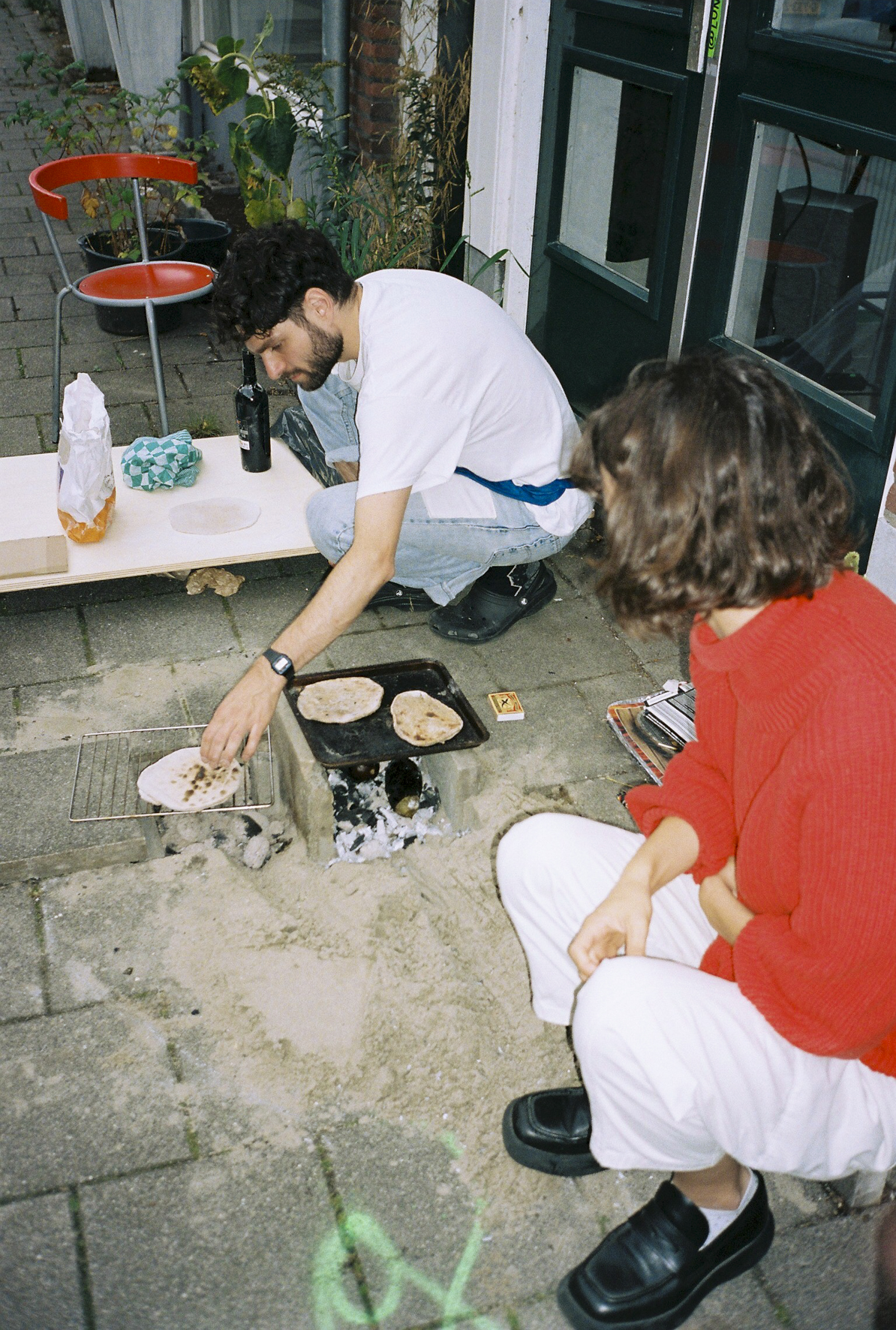
Kirsten: One thing I also quite like here with the neighbors is that the little kids are the most blunt ones that come to the door when it’s open and are like, “So what do you do here?” I’ll be like, how do I explain to a 7 year-old what I do or what we do, and that this is “work”, while realizing what an amazing dream it is to just have a place with your friends where you make things on your computer all day.
Emma: We just play on our computers here with friends.
Kirsten: That’s what it must look like to them. At the same time, you also want to take the question seriously, take them seriously.
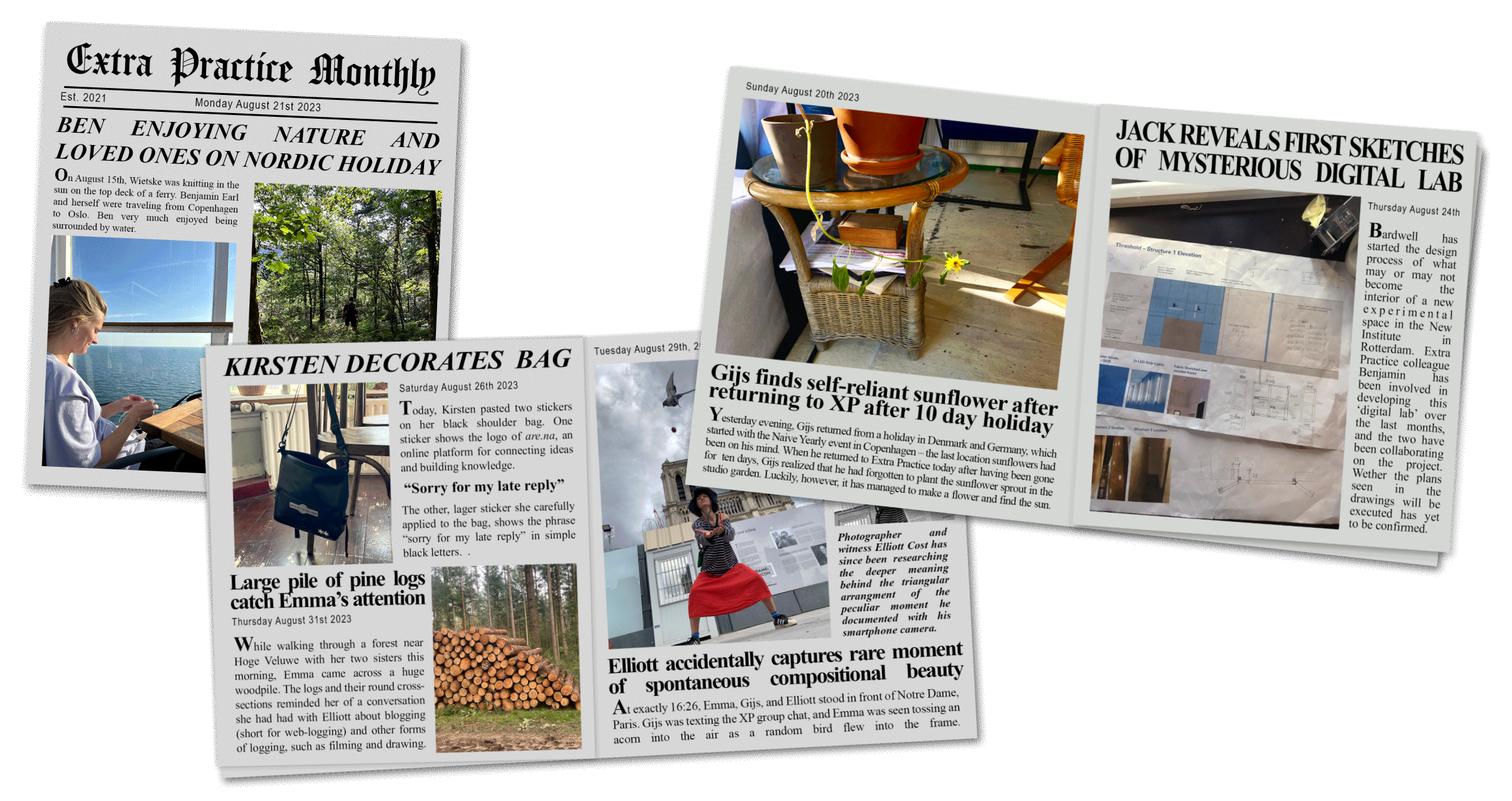
Illustrations from Newspapers from yesterday
Elliott: You guys have a really special monthly newsletter. How did it form and how do you write it?
Emma: Ben started it.
Ben: The actual formation of what it’s become happened organically. It’s kind of just been taken up. I mean, the thing that has stuck is the strict rhythm, mostly, even though we do miss a couple of times. The actual form of it and its use changes each month depending on who takes it up. That’s a really nice example of what I think Extra Practice is good at because it’s a collective thing that we all do throughout the year but somehow it still represents each of us individually. So it’s bigger than just our individual practices. Laurel had a really good way of putting it, it’s like our expanded practice. Like, extra practices are our expanded practice for each of us. Thinking in a more holistic sense. I think the newsletter is a really good example of that.
Emma: I think it’s also interesting because none of us are really good at self-promotion. That was part of the beginning where we’re like, “Okay, this is a place where we can all share what we’re up to collectively and it feels easier to do it as a group than alone.”
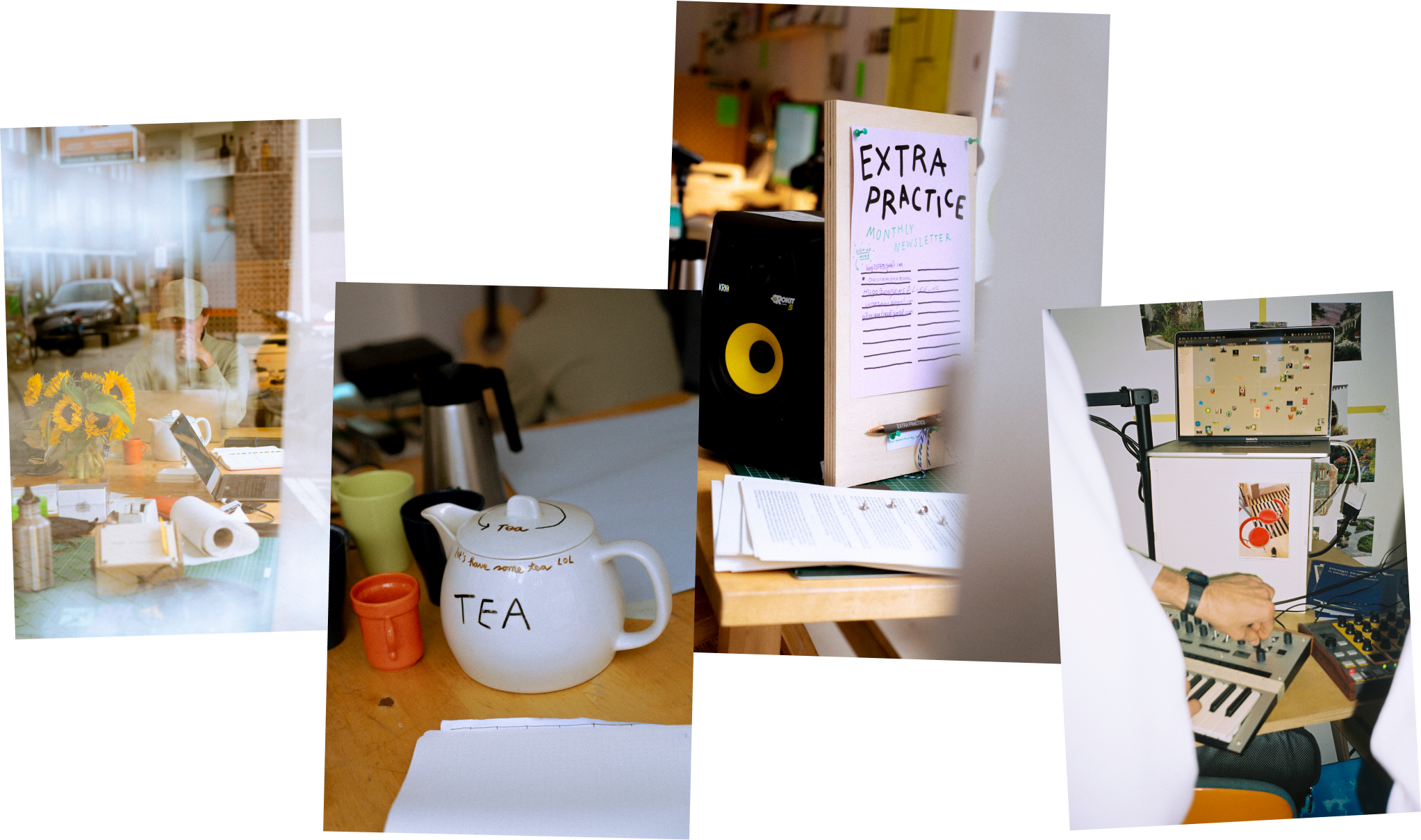
Photos by Dewi Kruijk
Jack: Yeah! And it’s basically a reason for each of us to write. It’s become a place where I can have a written output for things that I’m thinking about. Similar to Good Times Bad Times (the radio station), things we are talking about in the studio and things we’re talking about together, then we kind of form it into a bulletin for people.
Gijs: I’m actually quite proud of this form of collaboration we found. I find collaborating sometimes quite hard. Whenever we do things collectively, there’s always figuring out what the roles are. But with this newsletter, there’s this clear format of one of us leading it and asking the others for contributions within the leader’s conceptual frame. It can be a picture, text reflection, sound, voice memo, whatever. I just really love it, how it enables us to collaborate in a soft way. It’s a collective practice where each of us can share our individuality, whether you’re leading or contributing.
Tiana: It also makes me think of documentation and archiving, and maybe even a form of manifestation. Do you ever think of it like that? Do you think if XP ever fades one day, would you want to keep your archive of newsletters?
Jack: We print them off and physically archive them.
Emma: It would be beautiful to read them back in like 10 years. I would love it.
Jack: Yeah, maybe we should do an exhibition of a publication of all the newsletters. Every so often we scan them and upload them to our Are.na channel. It’s interesting to think of this space in the kind of landscape of design studios or art studios. Ben mentioned that a lot of those sorts of spaces are disappearing because rents are going up. So the newsletter becomes an archive of what this space was and where it fitted into this landscape of studio spaces.
Tiana: I’m wondering if you might have any advice for people who don’t have a space like XP yet? Maybe in different cities it’s harder to get started on something like this, but where would you advise someone to start?
Ben: Maybe stay with your friends, like always do it with your friends. That’s kind of it.
Emma: Actually, when we rented this space it was expected by the landlord to become a commercial space. We lied a little bit that we are a graphic design studio, that we will be making money here, which we knew we weren’t going to, at least not as a company. It’s the same now with our new space. So, stay true to what you want to do, but also use the structures that are offered and find a way to make them work for you.
Kirsten: It’s hard to rent a space with a group of people where everyone has enough room for a desk for themselves, so just go for a smaller space with a larger group of people and have a sort of clubhouse where you come together. It’s similar to how we started, by going to each other’s apartments sometimes for a coding club, or just hanging out online.
A few highlights from the Extra Practice monthly email newsletter:
-
Moving and zooming out/in (Dec 2023)
-
Expectation vs. Reality (Nov 2023)
-
Newspapers from yesterday (Aug-Sep 2023)
-
Compassion and compass-making (June 2023)
-
Fontainebleau, mountains and valleys (May 2023)
-
Display names, Wiki and swimming (Mar 2023)
- Name
- Extra Practice
- Vocation
- artists, designers, researchers
Some Things
Pagination
